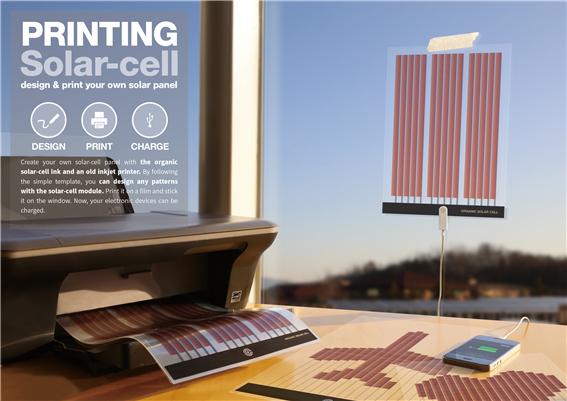people
Professor Sang-min Bae of the Industrial Design Department at KAIST garnered one silver and two bronze awards from the 2015 International Design Excellence Awards (IDEA). Along with iF Design Award and Red Dot Design Awards, the IDEA is regarded as one of the world’s most respected recognition in the field of design.
Trash to Bin (T2B), a silver winner in the category of Social Impact Design, is a trash bin made of 1.87 lb (0.85 kg) of discarded papers. Using one-hundred percent recycled paper pulp, each T2B costs under $5 for production. The bin can be fully waterproofed for at least six hours. While satisfying with the industry safety standards, this environmentally-friendly bin can be produced on a large scale using litter energy, but offering the exact same benefit of a general garbage can.
Roll-Di, one of the two bronze winners, is a direction indicator that tells which string of screen curtains should be pulled to make the curtain go up or down. As shown in the picture below, Roll-Di can be installed at the bottom of the string, and the “up and down” arrows show which side of the string needs to be pulled to achieve the desired position of the curtain. This simple, yet handy solution to the problem that people frequently make the mistake of pulling the wrong string provides users with greater convenience.
The other bronze winner is Printing Solar-cell, an organic cartridge module that prints solar-cells using a domestic, ink-jet printer. With Printing Solar-cell, users can design their own cell patterns and charge their electronics anywhere holding the printed solar-cell on a copy paper.
Professor Bae said, “I’ve always tried to design something that is useful for people in need. I consider the IDEA awards an encouragement to keep up with my work toward that goal.”
Trash to Bin

Roll-Di

Printing Solar-cell

-
policy Strengthening Industry-Academia Cooperation with LG CNS
On November 20, KAIST signed an MoU with LG CNS for industry-academia partnership in education, research, and business in the fields of AI and Big Data. Rather than simply developing education programs or supporting industry-academia scholarships, both organizations agreed to carry out a joint research project on AI and Big Data that can be applied to practical business. KAIST will collaborate with LG CNS in the fields of smart factories, customer analysis, and supply chain management analysi
2017-11-22 -
people Humicotta Wins the Silver Prize at the 2017 IDEA
The 3D-printed ceramic humidifier made by the research team led by Professor Sang-Min Bae won the silver prize at the 2017 International Design Excellence Awards (IDEA). Professor Bae’s ID+IM team was also listed as winners of three more appropriate technology designs at the IDEA. The awards, sponsored by the Industrial Designers Society of America, are one of the three prestigious design awards including the Red Dot Design Award and the iF Design Award in Germany. The silver prize w
2017-09-14 -
event KAIST to Participate in the Summer Davos Forum
KAIST will participate in the 2017 Summer Davos Forum in Dalian, China from June 27 to 29. The Summer Davos Forum with the official title “Annual Meeting of New Champions” is an annual international meeting co-hosted by China and the World Economic Forum (WEF) to address global issues which has been held since 2007. Focusing on this year’s theme ‘Achieving Inclusive Growth in the Fourth Industrial Revolution,’ science and technology experts from 90 different co
2017-06-21 -
people Prof. Sang-Min Bae Receives 2017 iF Design Award
Prof. Sang-Min Bae and his research team from the Industrial Design Department of KAIST submitted a winning entry to the 2017 iF Design Award named ‘Culture BOXCHOOL’. The iF Design Award is an internationally renowned design contest that is recognized as one of the top three design awards in the world along with the Red Dot Design Award and the IDEA Design Award. It has been held annually by iF International Forum Design since 1953. A total of 5,575 entries from 59 countries entere
2017-05-18 -
policy KAIST's Top 10 Contributions to Korea and the World
Established in 1971, the Korea Advanced Institute of Science and Technology (KAIST) started off as a relatively modest graduate school in a few disciplines in science and technology, but has gradually expanded into a full-fledged research university over the years. From the beginning, KAIST was intended to offer an elite science education, setting it apart from other universities in Korea. A majority of its graduates have contributed to the development of, what the world now praises, Korean
2015-11-27